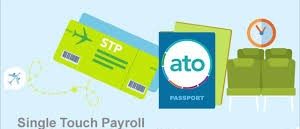Bad debts are death
Bad debts are death particularly if you trade on narrow margins.
A bad debt of a $1,100 invoice will not have a GST impact if you are registered on a cash basis. But a $1,000 of income at a 20% margin will require another $5,000 of sales to cover that loss.
So think twice before selling to customer who you doubt will pay you.
Or perhaps take payment up front.
Or perhaps set up a payment facility and don’t do anything until accepted.
Or ring us as we have dozens and dozens of solutions and strategies gained from years of dealing with different clients in all sorts of industries.
STP and super payments
The roll-out of Single Touch Payroll (STP) has proved to be an interesting process!
For some, it just meant clicking another button or two within their payroll program.
For others it meant changing the whole way they processed their payroll.
It has also uncovered some interesting practices.
We have been somewhat surprised to find that some clients weren’t making their employee SG super payments through a SuperStream, nor using a super clearing house. The former is the payment method, the latter is the notification of employee’s contributions. We have also been surprised to learn that super funds, like some of the really big ones, have still been accepting cheques.
There are free solutions out there but the best solution is almost always the one built within your payroll software. Whilst there may be a cost, it is nominal and avoids double handling.
Please call us if you would like to discuss your situation and needs.
WorkCover remuneration certification
It may be time to complete your 2019 WorkCover remuneration certification. Large employers are required to submit early.
Other employers have delayed lodgement dates. That said, it still may be in your interest to lodge soon. This is particularly the case if your remuneration will be significantly less in 2019/20 than for 2018/19.
You will get back what you over pay based off their estimate; but why over pay in the first place.
You will also ensure it is lodged. Many employers forget to lodge and suffer from WorkCover’s default 20% annual increase. So get it done now when you have finalised and issued the PAYG Payment Summaries.
When growth is bad (and running out of cash)
The following is a re-post from February 2015. It has been re-posted as it has been a topic of discussion with a couple of existing clients as well as potential new clients.
With our existing clients, we are planning around how fast they can grow and the issues around including cash flow, cash reserves, need to borrow as well as many other issues including their staffing and training. We have created a clear picture of what sustainable growth will look like, can measure how we are tracking and are dedicating the necessary resources in a planned roll-out.
On the other hand, some potential clients have come to us and they have found themselves, as you could say, in a pickle. Sadly with no proper planning they didn’t see it coming. It has come as a very rude and great shock. Pity their accountants didn’t provide such planning and cash flow assistance.
Last week I queried whether your plan will work and touched upon good and bad growth.
Increasing sales is not the answer to everything. It is not uncommon to see a business solely concentrating on increasing sales fall part if they haven’t ensured the business has the right team and systems in place to support greater turnover.
Worse still, some businesses even fail as they run out of cash due to the increased revenue not being enough to fund greater expenses and the greater amount of money locked up in debtors and stock.
Consider this……
Take a business that doubles its sales from $1,000,000 to $2,000,000 and everything else doubles from:-
- Cost of goods sold from $700,000
- Overheads from $175,000
- Net profit from $75,000 (average tax rate remains at 40%)
- Debtors from $125,000
- Stock from $160,000
- Creditors from $75,000.
Sounds good?
Actually, it’s a disaster.
Why – because the working capital required has doubled from $210,000 to $420,000 whilst the doubling of profit after tax has only generated an extra $150,000 – of which $60,000 will go in tax. What seems to be a new dawn will actually prove to be a nightmare. The business owner in such a case might think they are going forward in the right direction but there is something coming awfully big and fast straight at them!
The problem here is that the owner has concentrated on sales and sales alone. The outcome would be quite different if other key drives such as debtors, stock and creditors turnover were addressed (and for which we have many strategies from our many years of experience and supporting tools).
We were a member of the Principa accountants network (from which this example was generated) as well as other accounting groups that provide tools to assist our clients with cash flow control and planning – and for many other areas as well.
Why not refer to our web page’s article on business improvement potential. Or better yet, why not ring Alex Stewart and make a time to sit down and have an obligation free meeting to discuss how we can help your business.
So again I ask, will your plan work?
Other STP tasks
Single Touch Payroll (STP) started for all non-large businesses two weeks ago. So all business should by now be reporting wages at the time of payment.
For some this has meant using a payroll software program for the first time. This was the perfect opportunity to ensure that all other HR employment requirements had been attended to.
If you are still struggling with all of this then please contact us so we can discuss ways in which we can help you.
Why business planning is important
There is an old saying that if you don’t know where you are going then any place will do.
Business planning is crucial as it focuses one’s attention on how a business has been performing and how that can be improved. Thoughts in the car or shower are brought together and considered in context of all other pertinent matters. It also presents a road map to better performance.
With the start of a new financial year, now is a perfect time to:-
- Re-assess your performance over the last financial year.
- Set goals for the year ahead.
We can assist you this by:-
- Set financial benchmarks by which you can assess your performance.
- Set non-financial benchmarks by which you can assess your performance – such as the number of sales enquiries per week, the conversion rate of those enquiries … and many, many more from our extensive library.
- Show you the effect of changing the key drivers in your business.
- Integrate these budgets into your accounting software.
- Employ other reporting dashboards to track your performance.
- Hold you to account to your stated goals by regularly checking in with you.
Please call us if to arrange a free meeting. The meeting is free so we can gain an understanding of your and needs. Having gained an understanding of your circumstances and needs will enable us to explain the ways in which we can specifically help you.
As Einstein once said – the definition of insanity is doing the same thing over and over again and expecting different results.
Don’t fall that trap and call Alex Stewart now.
Are STP extensions the answer?
Struggling with Single Touch Payroll (STP?
Or have you yet to take action?
There are two things you need to do:-
- Move to a payroll software solution.
- Tidy up your HR records.
We can help you with both.
So whilst there are extensions available, we recommend not relying on them – it just creates more work (and therefore cost) later.
Take the first step right now by contacting us (the first meeting is free).
STP starts next week!
Single Touch Payroll (STP) starts next week!
From Monday 1st July all businesses will be required to report to the ATO each employee’s gross pay, tax and super no later than the day of payment.
Whilst there are extensions available we generally recommend not using them as it only creates more work later – and therefore cost.
If however you need to rely on an extension, then you must have applied for one by week’s end.
Either way, you have to do so something.
We have been taking our clients through the transition journey principally by way of a series of weekly preparatory emails.
If your accountant hasn’t helped you then it is time to change accountants! Contact us below and we can discuss how we can help you.
Last minute tax planning tips
With 30th June fast approaching, here is a list of common tax planning strategies that we have been discussing with clients:-
- Prepaid revenue can be deferred to the extent that it relates to next financial year and where a customer has the contractual right to cancel the contract at any time.
- Buying items such as stationery, printer cartridges, stamps, etc by Sunday 30th June. Those of you who entered the Simplified Tax System (STS) by 30th June 2005 (who are therefore automatically assessed on a cash basis) may wish to pay any bills not due until July like your phone bill, rent, printing and stationery, etc. Paying your accounting fees is also recommended!
- STS taxpayers are now known as Small Business Taxpayers (SBTs). SBTs now include taxpayers with an annual turnover under $10,000,000. As we have previously highlighted, SBTs can claim a full deduction for any assets acquired costing less than $30,000 excluding GST – but note lower limits of $20,000 for assets bought before 29th Jan and $25,000 before 2nd April.
- The $30,000 limit will apply to assets bought ad installed rady for use by 30th June 2020.
- The $30,000 asset write off has also been granted to businesses with annual turnover up to $50,000,000.
- SBT taxpayers can claim half a year’s depreciation on acquired assets that cost more $30,000 – even if the asset is purchased on the last day of the year. If a business owner buys a business asset costing $40,000 today, then they get to claim depreciation of $6,000 in this financial year followed by $10,200 in 2019/20. Buy that same asset in July 2019 and the claim by 30th June 2020 is only $6,000.
- For more on the instant asset write-off, refer to recent blogs titled Parts 1, 2 and 3.
- SBT taxpayers can also claim a full deduction for payments such as insurances, rent and the like which cost more than $1,000 even though the service period runs past 30th June and into the next financial year.
- For those of you who receive this e-mail that are employees or rental property owners, you can claim a complete write off for assets costing less than $300.
- If a property is jointly owned, then you can claim the full cost of assets costing less than $600 (meaning you claim less than the $300 limit each).
- Investors can claim prepayments in full. An investor with a property or share loan can claim a deduction for 12 months prepaid interest. Please note that the ATO requires that for the prepayment to be claimed, one must benefit through a lower interest rate (for which you need to keep proof).
- For those who have already generated a large capital gain, consideration should be given to selling other investments that have an unrealised capital loss. Those with no or minimal employer SGC support should consider making a deductible contribution into superannuation to offset the tax on the capital gain (but speak to a financial planner first).
- If you are about to sell an asset which will generate a capital gain, consideration should be given to selling it after 30th June. This will defer the payment of any capital gains tax liability until after 30th June 2019.
- Companies can accrue a director’s fee which is not payable until the following financial year. Why? – the company gets a deduction in this financial year but the director is not assessed on the income until the following financial year in which it is received. The trick is to document it correctly.
- If you have stock, count it (a separate e-mail will be sent to business clients with stock). As stock can legally be valued differently from item to item and from year to year, it can result in some advantageous outcomes.
- Donations are deductible. It must be a genuine donation so you can’t receive anything in return. Raffle tickets can’t be claimed.
- Our tax planning checklist also considers other items such as writing off bad debts, making Division 7A loan repayments, distributing to a new beneficiary, varing PAYG Instalments, super rule changes that you may benefit from (after receiving financial planning advice) valuing stock by using costs or net realisable selling method. How these and other opportunities are employed depends on your circumstances.
All of the above tax planning tips are explained to our clients in any easy to read Tax Planning Report.
We welcome any query about these tax planning tips but also in respect of your preparation for Singe Touch Payroll (for which our clients have been receiving weekly preparatory updates ahead of the start date of 1st July 2019).
$30000 asset write-off limit
So what if you want to buy an asset costing more than $30,000 (ex GST)?
Well as a small business, you will be able to claim 15% depreciation on the cost of the asset. So a $50,000 asset bought today will still generate a $7,500 tax deduction in the 2019 tax year (and $12,750 next year).
Buy the same asset on say 7th July, and your claim for next year is only $7,500.
And you still may be able to write-off the balance in the 2020 year for an asset costing more than $30,000. The $30,000 limit also applies to the undepreciated pool balance. We had one client buy a vehicle for $35,000. Come July 1 2019, the pool balance will be $27,500 (as that is the only asset they are depreciating). They can write off the balance of the car in the 2019/20 year.
Please refer to our three part series of 21 tips and traps for the instant asset write-off. Or better yet, call us on 9899-7511 to discuss your situation and opportunities.



